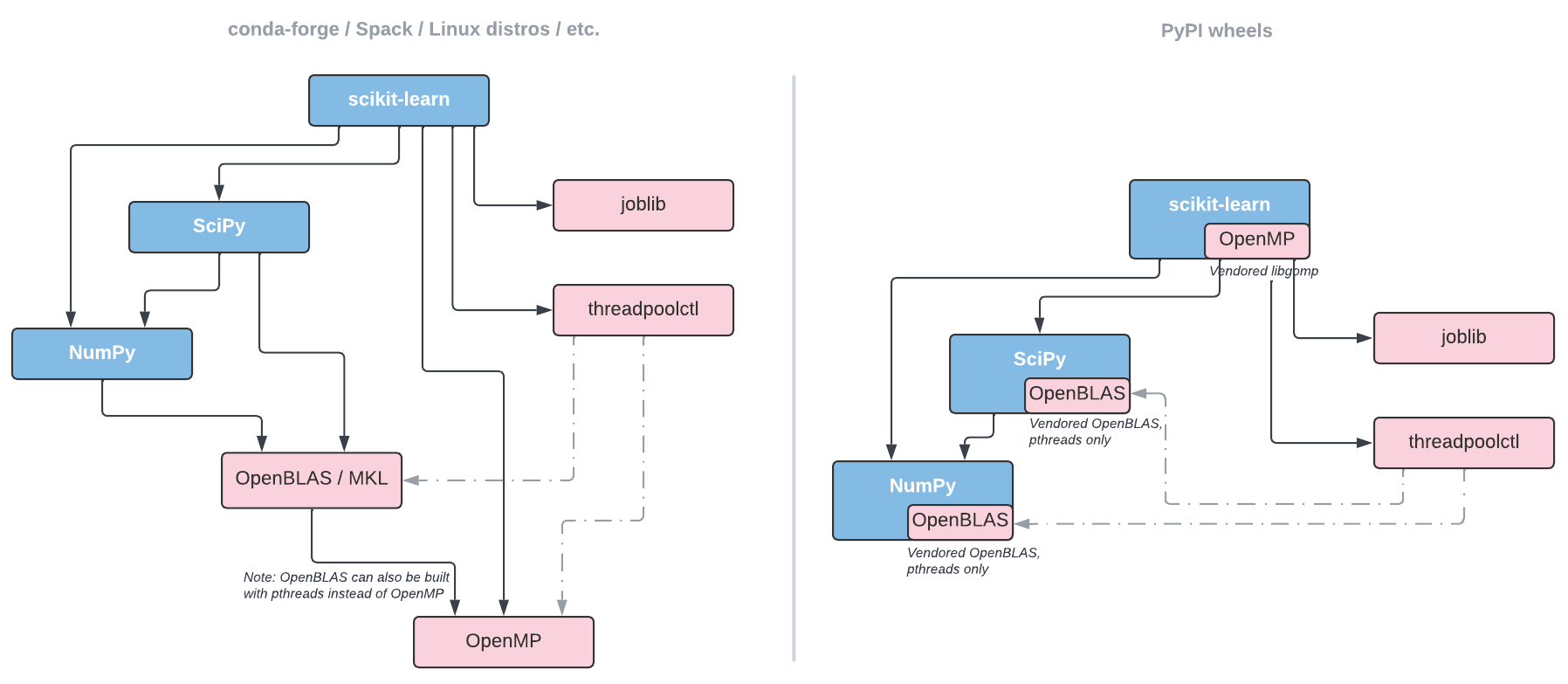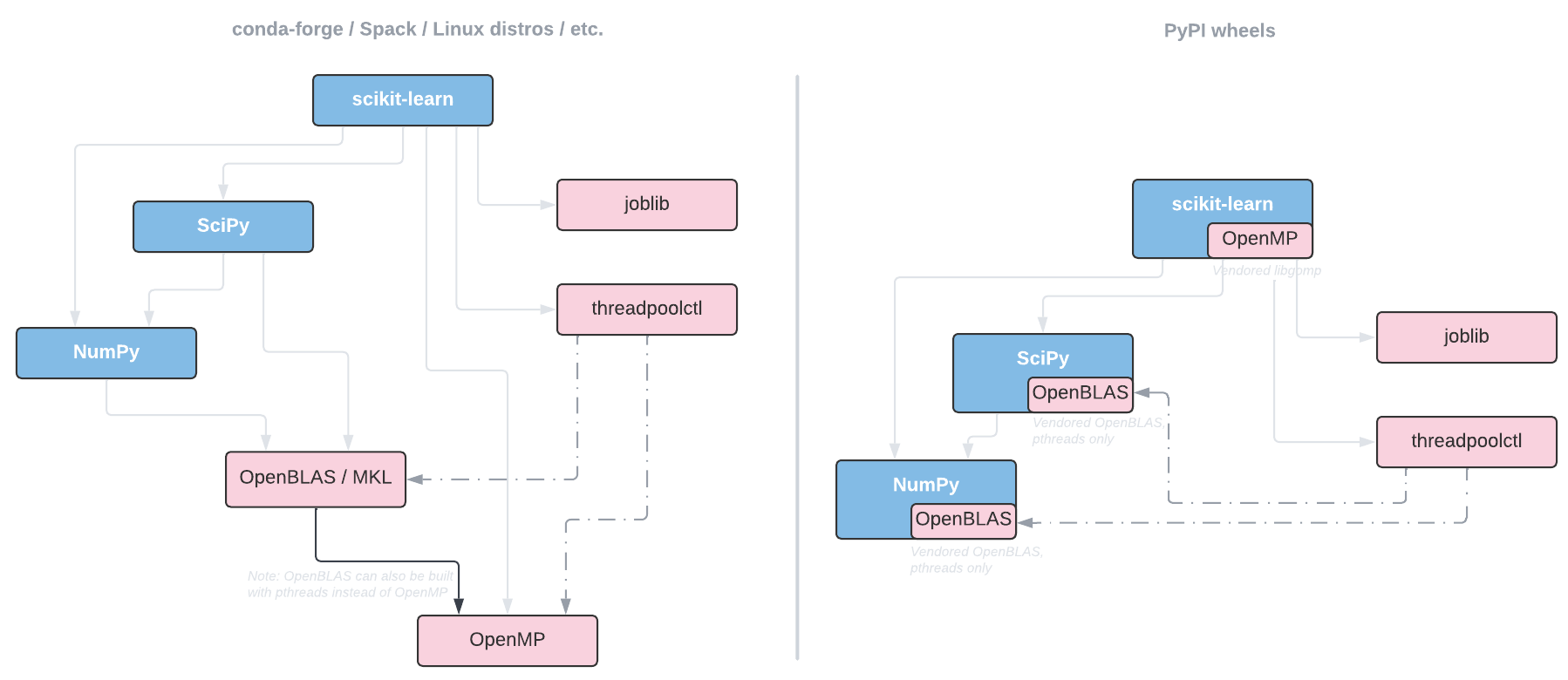BLAS, LAPACK and OpenMP
BLAS, LAPACK and OpenMP are key libraries for scientific computing. BLAS and LAPACK provide linear algebra functionality, and OpenMP provides primitives for parallel computing on shared memory machines. They're written in C, C++, Fortran, and even some assembly code. They are typically not packaged on PyPI (MKL is the exception). The most popular libraries for BLAS and LAPACK are OpenBLAS and MKL; they provide both BLAS and LAPACK1. NumPy and SciPy depend on BLAS and LAPACK; scikit-learn depends on OpenMP. BLAS and LAPACK libraries themselves can be built to use OpenMP or pthreads.
Two things make dealing with these native dependencies extra challenging:
- There are multiple independent implementations of the BLAS, LAPACK and OpenMP API specifications. They adhere to the same API, but may be built with different ABI, make different choices for symbol names for 64-bit builds, etc.
- All packages in an environment should use the same library for each of BLAS, LAPACK and OpenMP, because otherwise issues with threading control will occur. This is difficult to guarantee if wheels must be self-contained; it's clearly at odds with vendoring.
What are BLAS and LAPACK exactly?
BLAS (Basic Linear Algebra Subprograms) are routines for basic vector and matrix operations. LAPACK (Linear Algebra PACKage) builds on top of BLAS and provides more complex linear algebra routines. Both have a reference implementation in the Netlib repository, written in Fortran: BLAS, LAPACK. BLAS also has a reference C API, named CBLAS which is widely implemented; LAPACK correspondingly has a C API named LAPACKE, however that is less widely implemented.
A lot of libraries implement the BLAS and LAPACK interfaces. This is typically done to obtain maximum performance, and optimized for particular hardware. The performance improvements over the Netlib version are often in the 10x-100x range, and given how critical linear algebra is to scientific computing and deep learning, these libraries and their performance characteristics are of major importance.
Well-known implementations include OpenBLAS, Intel MKL, Apple Accelerate, ATLAS (no longer updated, but still shipped especially by Linux distros), BLIS (BLAS-only) and libflame (LAPACK-only, builds on BLIS), AMD's AOCL-BLIS and AOCL-libFLAME, and ARM Performance Libraries. Those are all for CPU; there are more libraries for GPUs and other accelerators, as well as libraries supporting sparse and graph data structures.
What is OpenMP exactly?
OpenMP (Open Multi-Processing) is an API that
supports shared-memory parallel programming in C, C++ and Fortran. It is
widely used, from regular laptop/desktop to large supercomputers. There are
many implementations, often shipped together with compilers. Commonly used
implementations (which we may find vendored in wheels on PyPI) include
the GCC implementation (libgomp), the LLVM implementation (libomp), and the
Intel implementation (libiomp). For a comprehensive overview, see
this overview.
Current state
NumPy vendors OpenBLAS as a shared library in the wheels it uploads to PyPI. SciPy also vendors OpenBLAS, in the same manner as NumPy - just not the same version, NumPy moved to ILP64 (64-bit) OpenBLAS while SciPy uses the default 32-bit build. Those OpenBLAS libraries are built with pthreads. In conda-forge and Homebrew on the other hand, OpenBLAS is built with OpenMP. The OpenBLAS build for wheels requires a separate repository with CI - see macPython/openblas-libs. The build is maintained mostly by NumPy and SciPy maintainers - and as can be seen from the history in the repository, it's a lot of work. To make matters worse, NumPy and SciPy want tight control over the version of OpenBLAS they ship with, because another version may cause segfaults or wildly incorrect numerical results. Hence upgrading is very hard. Things have gotten a little better recently though, and it may be an option to start depending on OpenBLAS as a separate package with a version range rather than an exact pin. openblas-libs#86 discussed in-progress work to create a separate wheel for OpenBLAS; not ideal to have to maintain that, but an improvement over vendoring separate versions in NumPy and SciPy wheels.
Scikit-learn depends on OpenMP directly for an increasing amount of its
parallel execution, and vendors libomp/libgomp in its wheels. It depends on
SciPy for linear algebra functionality - in particular, the Cython interface
to BLAS and LAPACK that SciPy provides. The scikit-learn team also created
threadpoolctl, a separate package
specifically to control the parallelism across NumPy, SciPy, scikit-learn, and
any installed BLAS, LAPACK and OpenMP libraries.
PyTorch statically links MKL (except on macOS) and vendors OpenMP (libiomp on
Windows/macOS, libgomp on Linux) in its wheels.
TensorFlow uses Eigen for linear algebra functionality. This is a header-only C++ library, different from BLAS/LAPACK implementations and easier for distribution. For parallel execution, TensorFlow does use OpenMP. It is statically linked rather than vendored.
Deep learning libraries are often their own "silo", providing all functionality in one coherent framework. When they are installed side-by-side with other packages, there are issues though with conflicting libraries. However, the problem is worse in the PyData stack. Here is what the situation look for just NumPy, SciPy and scikit-learn:


As we can see, there are multiple issues that are unique to PyPI:
- We have multiple copies of OpenBLAS rather than just one. Also different versions, breaking the "one version rule",
- No runtime switching of BLAS libraries, because of vendoring,
- Mixing pthreads and OpenMP parallelism, resulting in oversubscription issues,
- A diamond dependency, where NumPy and SciPy both depend on OpenBLAS. Making upgrades that not synchronized harder, even if those projects will be able to release a single OpenBLAS wheel in the future.
When for example PyTorch is installed, the problems multiply - now we also have a second vendored OpenMP library in addition to two BLAS/LAPACK libraries.
Example: PyTorch & OpenMP
PyTorch makes heavy use of OpenMP. And has a lot of issues with it - partly
because OpenMP is inherently complex, and partly because of packaging
limitations. One recurring problem is deadlocks in combination with
multiprocessing (see, e.g.,
pytorch#17199).
These are caused by the GCC implementation of OpenMP (libgomp) not being
fork-safe, and multiprocessing defaulting to 'fork'. The LLVM
(libomp) and Intel (libiomp) implementations are fork-safe, therefore
if the dependency could be expressed in package metadata, it would be
easier to avoid the problem. The dependency of PyTorch on OpenMP is
completely implicit in pyproject.toml/setup.py metadata however.
Here is another example issue, where a PyTorch build inside a virtualenv picks up an OpenMP implementation in an uncontrolled fashion, because it's an implicit dependency and hence build results get affected by another package pulling in an OpenMP library: pytorch#18398.
Note: there is an active discussion
(cpython#84559,
Discourse thread - Dec'22)
to change the default multiprocessing context away from 'fork'.
System package managers usually have a way of dealing with multiple implementations of an API, through building against a reference package with stubs as a "virtual dependency". This can be a generic mechanism, or specific to the dependency type.
Conda manages BLAS, LAPACK and OpenMP (and other such complex dependencies, like MPI) through mutex metapackages, which ensure a single version of an implementation is installed and allow users to switch between implementations. Spack uses virtual dependencies which work in a similar fashion.
Linux package managers may do something similar
(e.g., Debian uses update-alternatives
applied to libblas and liblapack),
or they may use a more a more specific way of managing BLAS and LAPACK, such as
Fedora using Flexiblas.
BLAS/LAPACK demuxing2: FlexiBLAS, libblastrampoline & SciPy's cython_blas/cython_lapack
Supporting multiple BLAS and LAPACK libraries is quite challenging, because of API and ABI incompatibilities between them. In particular:
- API's using 32-bit (LP64) or 64-bit (ILP64) integers as indices of
vectors/matrices (see
here
for details). Typically a BLAS/LAPACK library supports both at the
source level, and how the library is built determines which one is used.
ILP64 builds may or may not use a symbol suffix -
64_being the common one, but that's not a universal convention. - g77 vs. gfortran ABI. MKL and Apple Accelerate use the g77 ABI (or "f2c calling convention"), while all other common libraries use the gfortran ABI.
In addition, libraries may implement different versions of the reference Netlib APIs,
and CBLAS and LAPACKE support are not universal. To deal with this, a
demuxing library (or wrapper library) may be a good solution. Its job is to
provide a uniform API and ABI to any package using it. There are several
examples of this: FlexiBLAS3
is a standalone library to do this at the C/Fortran level,
libblastrampoline
does this for Julia, and SciPy's scipy.linalg.cython_[blas|lapack] submodules
provide a C/Cython interface to other Python packages.
If other Python packages can accept a dependency on SciPy, that's their best option. SciPy itself has to deal with the full complexity of discovering and building against arbitrary BLAS/LAPACK libraries.
Problems
- Building from source is quite difficult. Dependencies on BLAS, LAPACK and OpenMP cannot be expressed, and end users will typically not have it installed, or they do have it but it's not found, or it's the wrong version. In addition, variations between system package managers are not easy to handle (e.g., Fedora fails to ship pkg-config files for OpenBLAS, Arch Linux fails to include LAPACK in OpenBLAS, etc.).
- Building wheels is way too much work. Maintainers of each project using BLAS
and LAPACK are responsible for building it themselves (which is painful) and
then vendoring it. In addition, in the case of OpenBLAS, it requires
vendoring
libgfortran. - Deadlocks due to use of
multiprocessingin combination withlibgomp. - Issues due to using more than one library of the same type. See for example scipy#15050 ("Performance issue on macOS arm64 (M1) when installing from wheels (2x libopenblas)") and openblas#3187 ("Slowdown when using openblas-pthreads alongside openmp based parallel code").
- As a result of the above-mentioned problems with OpenMP, SciPy bans usage of OpenMP completely even though it would be of significant interest to use OpenMP. Scikit-learn is gradually expanding its usage of OpenMP, but is running into problems.
- No runtime switching of implementations when installing from wheels. This makes testing, benchmarking and development work more difficult.
- MKL does provide wheels but cannot be linked to due to the wheel spec. And MKL itself is >100 MB in size, so vendoring it isn't reasonable.
History
TODO
Relevant resources
- scipy#10239 - can OpenMP be used portably
- array-api#4 - Parallelism - what do libraries offer, and is there an API aspect to it
- OpenBLAS build config for vendoring into wheels: MacPython/openblas-libs
Potential solutions or mitigations
- A mitigation to not make things worse: stay with the status quo, do not use more OpenMP. Not a very satisfactory one though.
-
Build wheels for OpenBLAS and perhaps also OpenMP and maintain those on PyPI.
-
Issue: who takes responsibility for these, and decides on changes over time (possibly breaking ones)?
-
See this gradual evolution plan discussed between scikit-learn and SciPy maintainers: scipy#15050
-
-
Larger changes to PyPI/wheels to get to parity with system package managers. This will require dealing with several "meta topics", like a build farm and PyPI's author-led social model, in addition to implementing something like virtual packages.
- Making it possible to express dependencies on libraries outside of PyPI.
- Making a distinction on PyPI between pure Python packages and other packages. With the latter set of packages all being provided by a system package manager.
-
Note that it is possible to build OpenBLAS without LAPACK support. This is a bad idea, however Arch Linux does do this anyway (as of Dec 2022, see scipy#17465). Accounting for such nonstandard choices by individual packagers of system dependencies makes dealing with native dependencies extra difficult. ↩
-
The term demuxing here stands for demultiplexing, in the sense of splitting a single "signal" (e.g. multiply these two matrices) into several channels for the various supported implementations of BLAS/LAPACK. ↩
-
Note that FlexiBLAS is GPLv3 licensed, with a LGPL-like runtime exception that only covers the Netlib-equivalent part of its API (that may not be enough, see scipy#17362). ↩